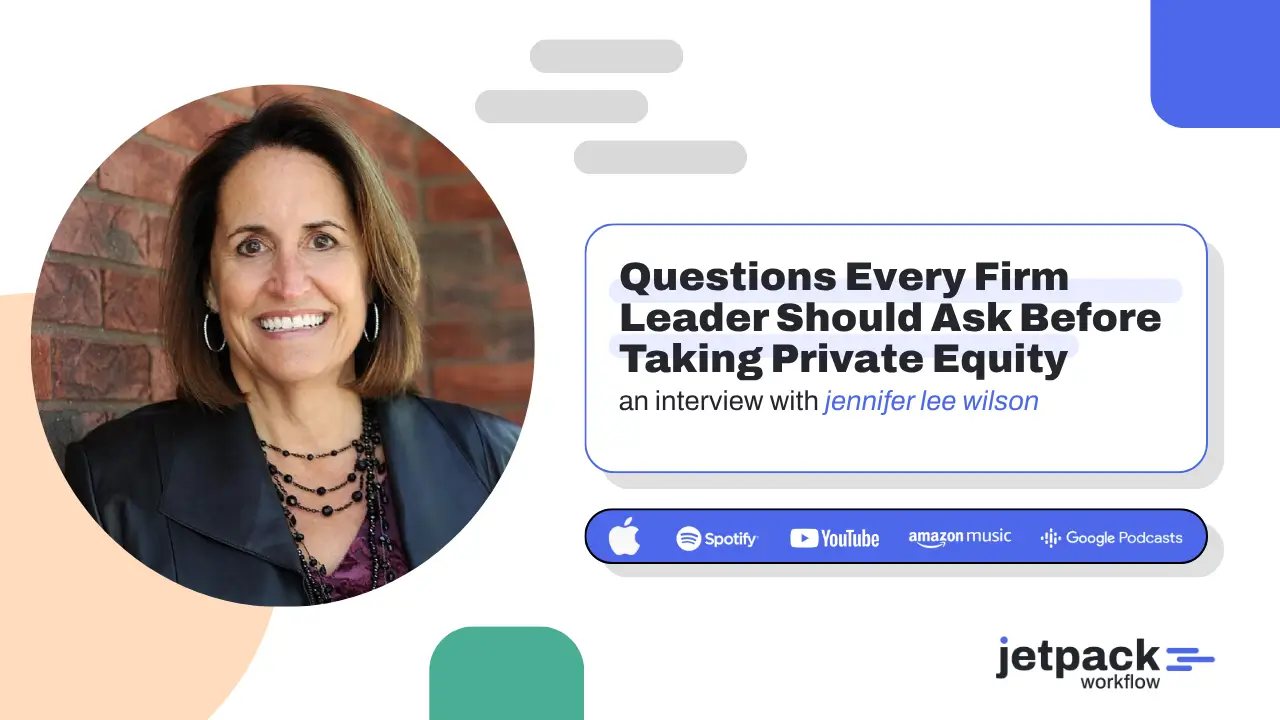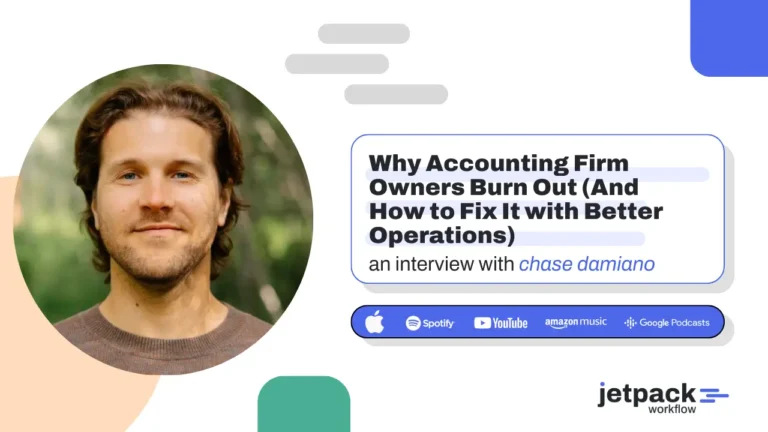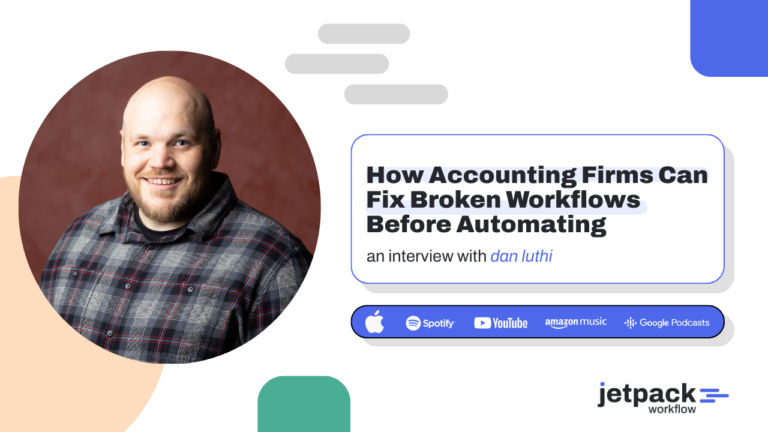Questions Every Firm Leader Should Ask Before Taking Private Equity: Jennifer Wilson’s Guide

Key Takeaways
-
Not every accounting firm needs to sell or merge to grow.
-
Private equity (PE) offers capital but comes with cultural and operational tradeoffs.
-
Firm owners must ask critical questions about valuations, control, and sustainability before signing a deal.
-
Independence, stewardship, and unity can still drive long-term success without external investment.
-
PE models may prioritize short-term returns over conscious, people-first capitalism.
Meet Jennifer Wilson: Leadership Expert and Firm Advisor
Jennifer Wilson is the co-founder and partner at ConvergenceCoaching, where she advises accounting firms on leadership development, succession, and strategy. With over 25 years of experience, she has guided countless firms through change while helping many remain independent.
“We help firms remain independent. You don’t have to sell. You don’t have to merge. You can remain independent.”
What’s Driving the Rush Toward Private Equity?
Wilson opened her talk by explaining the factors fueling the PE wave across the accounting profession. She pointed to demographics, valuations, and fear of missing out as the main drivers.
Baby Boomer partners are retiring, leading to succession gaps. Private equity buyers are offering valuations far higher than traditional partner buyouts. Many firm leaders worry they will miss the moment if they don’t sell soon.
“The over-65 population is growing at 13%. That’s driving a lot of exits and talk about who’s taking over, what kind of money is needed, and who will care for the firm next.”
But Wilson cautions that much of the urgency is fear-based messaging from brokers and advisors.
“A lot of what’s being said on stage are fear-based messages telling you that you can’t remain independent or you won’t be able to compete with capital. I beg to differ.”
The Questions Every Firm Should Ask Before Taking Private Equity
Wilson encouraged firm owners to slow down and ask thoughtful questions before making life-changing decisions.
1. What Return Are Investors Expecting?
Private equity firms typically target a 20% annual return, often achieved through aggressive growth, cost-cutting, and expansion. This model may pressure firms to chase unsustainable results.
“I’m worried about the valuations. They’re 9, 10, even 14 times earnings. That’s a hard basis to return 20% on.”
2. What’s Their Strategy for Growth?
Wilson describes PE’s three-legged approach:
-
Drive the top line through aggressive sales and marketing
-
Spread geographically through acquisitions and service expansion
-
Increase efficiency by offshoring and automation
While these can increase revenue, they may also affect culture and client experience.
“We already have burnout and overwhelm. Cranking the volume on growth without fixing capacity can make that worse.”
3. How Will Culture Change?
Wilson believes culture is the biggest risk. Firms driven by stewardship and conscious capitalism may find themselves in conflict with a short-term profit model.
“We’ve been consciously capitalistic as a profession. Clients win, talent wins, communities win, and shareholders win. PE’s model shifts that toward maximizing shareholder value only.”
4. What Happens When PE Exits?
Firm owners should ask how investors plan to exit, how long they’ll stay, and what happens when they sell again.
“Ask what their exit strategy is. Who else have they flipped? What did it look like? What happened to those firms?”
5. Are There Real Examples of PE Improving a Profession Like Ours?
Wilson challenged attendees to find industries with similar dynamics, such as technical expertise and client relationships, where PE has improved quality.
“I keep asking audiences: what industries like accounting have PE changed for the better? I haven’t found them yet.”
The Hidden Costs of Selling
Wilson warns that selling to PE often leads to court-ordered change, which is rapid, non-negotiable transformation under someone else’s timeline. Many firm leaders sell because they feel tired or ready to exit, only to realize they must stay for several years under new management.
For an inside look at what happens after the deal closes, read Ashley Rhoden’s Integration Framework.
“If I have to stay for three years, I’m going to do court-ordered change on their timeline. I don’t get to control it.”
How to Remain Independent
Remaining independent is possible but requires strong leadership, unity, and innovation. Wilson encourages firms to build a growth culture that aligns with stewardship and long-term impact.
Key principles for staying independent:
-
A clearly defined culture rooted in stewardship
-
Partner unity and shared decision-making
-
Commitment to innovation and change
-
Strategic, not reactive, growth
-
Focus on serving ideal clients and doing work teams enjoy
Learn how SBA loans enable firm owners to scale without outside capital in Sarah Sharp and Shannon Hay’s SBA Financing Guide.
“You can grow a firm that gives you joy. You don’t have to serve everyone or chase unrationalized growth.”
The Role of Conscious Capitalism
Wilson’s final message centered on conscious capitalism, where all stakeholders win: clients, team members, communities, and shareholders.
“We exist to make things better and pass them on in better shape than we found them. That’s stewardship.”
She believes firms should hold onto this mindset even amid market shifts and financial temptations.
Conclusion
Jennifer Wilson’s session reminds firm leaders that selling to private equity is not the only path to growth. By asking hard questions and focusing on stewardship, firms can preserve their culture, independence, and long-term success.
“Maybe one of the questions we should ask ourselves is: is there really a get-rich-quick? I promise it comes with strings.”
Frequently Asked Questions
1. What should accounting firm owners ask before taking private equity?
Ask about investor returns, growth strategy, exit plans, and cultural impact. Ensure you understand the expectations for profit and control.
2. What are the risks of selling to PE?
High valuations come with expectations of rapid growth, cost cuts, and potential cultural changes that may conflict with firm values.
3. Is it possible for accounting firms to remain independent?
Yes. Wilson encourages building unity, innovation, and a clear culture of stewardship to grow without external ownership.
4. What is conscious capitalism in accounting?
It means focusing on all stakeholders, including clients, team members, communities, and shareholders, rather than short-term profit alone.
Before Taking Private Equity, Ask the Right Questions
Jennifer Wilson shares the critical questions firm leaders must ask about valuations, control, and culture before selling. Learn how the right workflow system can help firms grow confidently on their own terms.





